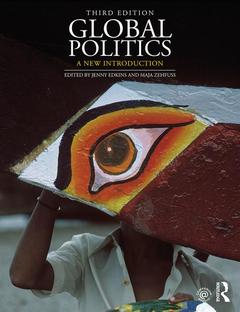Global Politics (3rd Ed.) A New Introduction
Coordonnateurs : Edkins Jenny, Zehfuss Maja

The third edition of Global Politics: A New Introduction continues to provide a completely original way of teaching and learning about world politics. The book engages directly with the issues in global politics that students are most interested in, helping them to understand the key questions and theories and also to develop a critical and inquiring perspective.
Completely revised and updated throughout, the third edition offers up-to-date examples engaging with the latest developments in global politics, including the Syrian war and the refugee crisis, fossil fuel divestment, racism and Black Lives Matter, citizen journalism, populism, and drone warfare.
Global Politics:
- examines the most significant issues in global politics ? from war, peacebuilding, terrorism, security, violence, nationalism and authority to poverty, development, postcolonialism, human rights, gender, inequality, ethnicity and what we can do to change the world;
- offers chapters written to a common structure, which is ideal for teaching and learning, and features a key question, an illustrative example, general responses and broader issues;
- integrates theory and practice throughout the text, by presenting theoretical ideas and concepts in conjunction with a global range of historical and contemporary case studies.
Drawing on theoretical perspectives from a broad range of disciplines, including international relations, political theory, postcolonial studies, sociology, geography, peace studies and development, this innovative textbook is essential reading for all students of global politics and international relations.
1 Introduction
2 How do we begin to think about the world?
3 What happens if we don’t take nature for granted?
4 Can we save the planet?
5 Who do we think we are?
6 How do religious beliefs affect politics?
7 Why do we obey?
8 How do we find out what’s going on in the world?
9 How does the way we use the Internet make a difference?
10 Why is people’s movement restricted?
11 Why is the world divided territorially?
12 How do people come to identify with nations?
13 Does the nation-state work?
14 Is democracy a good idea?
15 Do colonialism and slavery belong to the past?
16 How does colonialism work?
17 How is the world organized economically?
18 How does finance affect the politics of everyday life?
19 Why are some people better off than others?
20 How can we end poverty?
21 Why do some people think they know what is good for others?
22 Why does politics turn to violence?
23 What makes the world dangerous?
24 Can we move beyond conflict?
25 Who has rights?
26 Conclusion: What can we do to change the world?
Jenny Edkins is a writer and a Professor in the Politics department at The University of Manchester, UK.
Maja Zehfuss is Professor of International Politics at The University of Manchester, UK.
Date de parution : 01-2019
18.9x24.6 cm
Date de parution : 12-2018
18.9x24.6 cm
Thème de Global Politics :
Mots-clés :
Young Men; Global Politics; Ivory Coast; Jenny Edkins; World Development Report; Maja Zehfuss; West Germany; Introduction to Global Politics; OECD Stat Database; Introduction to International Relations; UK News Medium; Bayliss; USA’s Border; Peter Mandaville; Islamic Cultural Zones; Debbie Lisle; Occupy Wall Street; Simon Dalby; Junta; citizen journalism; Military Junta; fossil fuel divestment; Drone Crew; populism; Social Reproduction; refugee crisis; Fossil Fuel Divestment Movement; political theory; Muslim World; Syrian Refugees; Madres De La Plaza De; Overseas Chinese; Human Rights Campaigning; Exclusive Knowledge; Global Original Position; Advanced Liberal Rationalities; Fossil Fuel Divestment Campaigns; Military Age Males; SOPA



